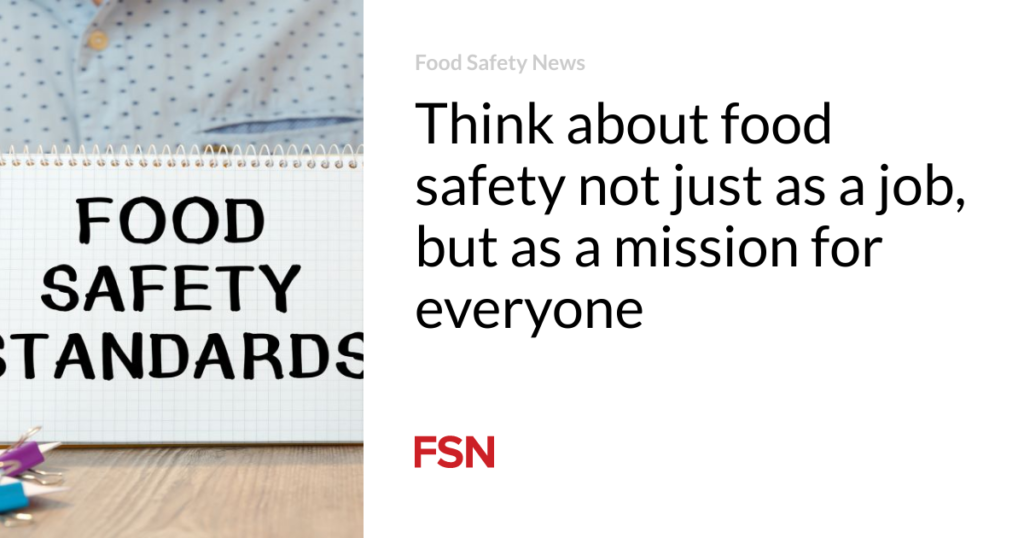Co-author Tyler Williams, Director of Scientific Services, PathoSans
– Opinion –
Each of the authors of this article has a specific role in their respective organizations. However, we are united in the belief that food safety is a significant public and personal health issue that affects us all. Food safety can, without warning, make healthy people ill or even kill them, including young children. Yet, despite the growing risks in an increasingly complex global food industry, food safety remains an issue that is often rooted in ignorance and a culture of blame.
Food safety is a major global health issue. In the United States alone, we have one of the safest food supplies in the world. Yet, according to the USDA, 48 million people get sick, 128,000 are hospitalized, and 3,000 die from food poisoning every year. One of the authors of this article experienced the death of a child from E. coli infection. So we know how real the risks are. We believe this problem needs to be more than “someone's job.” It should be everyone's mission.
Education and Public Policy
Often when serious food safety incidents occur, they are reported in local and national media, and sometimes even discussed on social media. However, people often get sick in ways that go unnoticed. Sometimes people are not fully aware of what is causing their illness, and food-related illnesses can be mistaken for the flu or other undiagnosed illnesses.
Unlike many other common consumer goods, food is often not well educated to consumers or workers, even though every human being consumes it every day. For example, a simple step stool has safety warnings printed on the side. But have you ever seen a safety warning about proper cooking methods inserted into a package of ground beef? Are the public aware that restaurants can remain in business without passing food inspections by their city or town? Are children being taught about food safety as part of their curriculum? In most cases, the answer to these questions is no.
The global business of food is a complex enterprise, with separate industries for growing, processing, manufacturing, and consuming. Addressing food safety at every possible touch point is a monumental task, one that has been undertaken by efforts such as the Global Food Safety Initiative and many national organizations in the United States and other countries.
Over the past 30 years, we have become better informed about food safety and have raised awareness of the issue. For example, many cleaning chemicals now have labels boasting information such as “effective at killing E. coli,” which can be deadly. Many new food safety policies have been implemented at the federal, state, and local levels. Educational institutions such as Northeastern University have incorporated education on food safety and regulatory policies into their curricula. Consulting companies have also sprung up, such as Detwiler Consulting Group, dedicated to helping food businesses improve their safety practices. We have worked with and guided public policy makers on improving regulatory standards for safe food practices. We have also worked to raise awareness of our “food culture” as something that impacts everyone's health.
Better cleaning and sanitation processes
Cleaning and sanitation play a vital role in themselves in curbing the spread of foodborne pathogens. PathoSans is a company whose philosophy is “cleaning with compassion” and has long been dedicated to its mission of providing effective and safe cleaning without the use of chemicals that can harm people, animals and the environment. In the food industry, our solutions are used in a variety of food applications, including restaurants and bakeries, fish processing companies, poultry farms and environmentally controlled agricultural facilities that use greenhouses for large-scale production of fruits and vegetables. Our applications are in use in the United States, China, Japan, New Zealand and Australia.
PathoSans' success in cleaning and disinfecting involves ECAS (Electrochemically Active Solutions) technology. Using only salt, water and electricity, two effective compounds, PathoClean and PathoCide, are created that work together to first clean and then disinfect. They do not have the drawbacks of many alternative solutions, such as harmful corrosive chemicals, noxious odors and additives that can cause allergies. They are also safe for the environment. This is an important consideration. Growing food is part of the environment, so why would you want to harm that environment with chemicals that kill bacteria but can harm plants and animals?
Understanding the Science of Food Safety
One of the keys to controlling foodborne pathogens using the ECAS approach is to take a closer look at the science behind it. That's why PathoSans conducts research in the laboratory and publishes its findings in scientific journals. One such study, “The Science of Food Safety”, was published by the Royal Society of Chemistry in Australia. Another study, “Discovering Better Ways to Protect Post-Harvest Fruits and Vegetables”, was also published by the same organization. These studies are part of PathoSans' ongoing commitment to develop better food safety approaches. This commitment is also reflected in our close collaboration with food industry clients to solve additional challenges.
The true meaning of the mission
Improved food safety and healthier, more effective cleaning methods. These are two goals worth developing into a mission, not just a job. Through our collaborative efforts on food safety education, policy improvements, and cleaning techniques, we are committed to our mission.
Part of that mission is not just to promise people better health, but to deliver on that promise. Food health is one of the most important human needs. Together, let's move in the right direction.
About the co-authors: Tyler Williams oversees all product development, quality assurance, and regulatory management for on-site electrochemical generators (OSGs) and product chemistry at PathoSans. Williams holds a BS in Chemistry from Purdue University and is a founding member of the Hypochlorous Acid (HOCl) Consortium, which is tasked with working with the EPA to increase awareness and acceptance of HOCl.
(Click here to sign up for a free subscription to Food Safety News)



